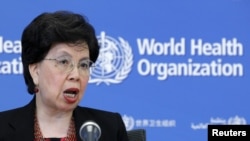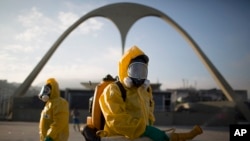The chief of the World Health Organization (WHO) says the Zika virus and other health emergencies will top the body’s annual assembly, which meets next week in Geneva.
WHO Director-General Margaret Chan says the more that is known about the Zika virus and particularly its impact on pregnant women, the more worrisome it becomes.
Zika currently is circulating in 59 countries, among them Brazil, which is hosting this year’s Summer Olympic Games. While Brazil is in the forefront of the epidemic, Dr. Chan says WHO does not support a travel ban to the Games.
Chan does, however, advise caution, especially for pregnant women who could give birth to babies with brain abnormalities if they become infected with the virus.
“Pregnant women should avoid traveling to these places who are reporting local infection.… Another important point is men who travel to these countries, including to the Olympics, should they be infected when they get home, they must practice safe sex, particularly if their partners or spouse are pregnant. So, they need to use a condom for the entire duration of the pregnancy,” she said.
More money for Zika fight sought
Chan says many lessons have been learned from the Ebola epidemic in West Africa; but, in order to apply these lessons to better contain the spread of newly emerging threats, such as Zika, she says the WHO will ask the assembly for a budgetary increase of $160 million dollars for the next two years.
The WHO chief tells VOA there are many other communicable and non-communicable diseases of great concern, with 76 health issues to be considered at the assembly. The meeting is expected to be the biggest ever, with some 3,100 delegates from the WHO’s 194 member countries in attendance. One of the biggest concerns, she says, remains that of maternal mortality.
“We still see close to 300,000 women die unnecessarily giving birth…. In poor countries, about [a] one in 60 chance of a woman dying from giving birth - one in 60 - in wealthy countries, one in 4,900. This is [a] huge inequity,” she said.
Chan says sexual reproductive health must be made accessible to young people so they have the ability to make the sexual and family planning choices that are right for them.












